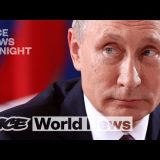Why Russia Isn’t Actually Collapsing
Get Nebula using my link for 40% off an annual subscription: https://go.nebula.tv/reallifelore
Watch part 2 exclusively on Nebula covering the Battle of Bakhmut: https://nebula.tv/videos/reallifelore-modern-conflicts-the-battle-of-bakhmut
Please Subscribe: https://www.youtube.com/channel/UCP5tjEmvPItGyLhmjdwP7Ww
RealLifeLore on Spotify: spoti.fi/47yMfzp
RealLifeLore on Facebook: https://www.facebook.com/RealLifeLore/
Select video clips courtesy of Getty Images
Select video clips courtesy of the AP Archive
Special thanks to MapTiler / OpenStreetMap Contributors and GEOlayers 3
https://www.maptiler.com/copyright/
https://www.openstreetmap.org/copyright
https://aescripts.com/geolayers/








Watch this video’s next part covering the ongoing Battle of Bakhmut on Nebula here: https://nebula.tv/videos/reallifelore-modern-conflicts-the-battle-of-bakhmut
Hi
Congrats for 7 million. And thanks for the video, keep it up! 👍👍
Videos like this should NOT have to be almost an hour long…plus the enunciations of words is honestly cringy. It’s a reason why I’m starting to watch less of these videos.
@rouge cheese it everyone get Nebula!
@Labyrinth6000you crying about it is cringe.
There’s a demographer, *Yi Fuxian,* who’s said that revolutions primarily happens when you have a relatively large, young population, primarily around the age of 15-30 approximately. Russia has the opposite of that.
Boomerocracy
@rar3gerontocracy*
Prigozhin’s uprising was not because of losses, but because of a personal conflict with Shoigu and ambitions to climb higher.
The narration on this video is too much.
Its like listening to a gadget salesman.
Take a breath, turn the volume down. Turn the quantity down.
personal conflict with Shoigu because of losses
Prigozhin spent months making videos complaining about losses, complete with images or videos of dead troops. One of his complaints was that supplies and proper equipment to Wagner was being throttled.
and he had a personal ego.
Well, nobody know why it happened, and since mr Prigozhin is recently “nullified” probably we’ll never know what was the reason of this “performance”
🎯 Key Takeaways for quick navigation:
00:00 📺 Video discusses the impact of Russia’s actions in Ukraine.
00:28 💥 Wagner Group, a Russian private military company, rebelled against Russian government.
01:39 🚁 Armed rebellion led by Wagner Group resulted in capturing cities in Russia.
02:51 🌍 Global concern as Russia seemed to be heading toward civil war.
03:47 📈 Long history of predictions about Putin’s regime ending.
07:05 👥 Putin maintains high public approval despite predictions of downfall.
10:03 🛫 Russian tourists continue to vacation abroad despite sanctions.
11:13 🛢️ Russia’s power comes from vast oil and gas reserves.
18:00 ⛓️ Price cap sanctions limit Russian oil sales to world markets.
20:45 🌏 Russia redirects energy exports to Asia and Africa due to sanctions.
22:25 ⛽ Global oil war between the U.S. and Europe vs. Russia and Saudi Arabia due to oil production cuts.
23:21 🛢️ Russia selling oil and gas to neutral countries like China, India, and Turkey.
24:34 💰 Russia’s defense spending increase, shifting towards a wartime economy.
25:45 🛠️ Russia’s industrial output for war effort includes uniforms, weapons, and more.
26:55 💸 Russian soldiers’ higher wages and payments to families of fallen soldiers.
27:38 📉 Russia running a historic deficit to sustain payments despite oil and gas revenue decrease.
28:18 🏦 Russia’s low national debt compared to GDP, potential cracks in the economy.
32:00 🌍 Ukraine’s demographic decline, labor force shortage, and worker migration.
34:44 🇷🇺 Russia’s larger manpower compared to Ukraine, impact of worker mobilization.
37:04 💰 Ukraine’s increased defense spending, dependence on foreign aid.
40:07 🇺🇦 Ukraine’s financial challenges, need for post-war rebuilding funds.
42:11 💣 Ukrainian dependence on Western aid, potential shifts in U.S. policy.
43:07 🕊️ Russia’s strategy: prolonging stalemate, financial pressures, public support.
44:31 🔴 Potential for instability in Russia due to war’s impact on soldiers and economy.
45:11 📊 Ethnic composition impact on separatist movements in Russia’s history.
45:53 🇷🇺 Russia’s current ethnic composition emphasizes its nation-state status.
46:21 🔴 Areas with histories of separatism in Russia: Dagestan, Chechnya, Ingushetia.
47:03 💰 Possible factors for Russian economy decline: oil price collapse, casualties in Ukraine, sanctions.
47:46 🛢️ Wagner Rebellion launched despite favorable conditions.
48:27 ⚔️ Enormous battle for Bakmut, Ukraine, and its significance.
49:10 🌍 Historical importance of Bakmut battle for Europe’s future.
50:07 💻 Nebula platform for exclusive content on modern conflicts.
51:04 🎥 Nebula classes for creators to learn and share expertise.
You da real MVP
Thank you bruh
👑
Dropped this friend.
Saved me an hour; thanks friend
Ty
One thing that needs to be understood about the Wagner rebellion is that it didn’t happen because how the war was going, but because the MoD (ministry of defense) ordered the dissolution of Wagner and the incorporation of it’s equipment and troops to the Armed Forces. Prigozhin achieved his main goal, making Wagner survive, at least for now
Edit: Prigozhin is NOT Wagner. Don’t be so dramatic
Prigozhin is dead.
Not really, taking into account all the Higher ranks of wagner are now dead including Prigozhin, the russian government will elect the next leader of wagner making it just an other branch of the Russian ministry of defense.
@Ix The Best That’s actually good. The main russian army have prooved thoroughly sub-par, Wagner will be much easier to deal with in Ukraine should Russia take over it’s command.
hes dead. wagner is screwed.
@Captain Harlock That’s a very optimstic perspective. In my opinion it was much better to have Prigozhin as a counter part of the russian government, but maybe you are right.
I am very sceptical about any conclusions made based on official data comming from Russia or any other country that is known exporting propaganda. Ofcourse I’m not saying it is incorrect, but them trying to convince the world that sanctions are less effective than they are is definately something I’d do if I were them.
Every country is heavily exporting propaganda these days, especially in regards to the war
What about the massive drop in the value of the ruble over the last year or so? Initially the Bank of Russia attempted to prop the currency up but that got too expensive. The Russians have failed to get their exports paid for in rubles so the price of gas/oil etc needs to increase at the same rate as the ruble drops in order for them to keep pace in real terms.
Because wages for soldiers paid in rubles, and it’s like 200k+ new contract soldiers this year.
From Simplicius 76 “Ukraine Commits last Remaining Elite Brigade”
TLDR: Russia is fine, ditching the dolar… The problem is the debt that is to be paid in dollars and need to be restructured (Also Rus has only 22% debt to gdp ratio, thats laugably low compared to the west)
Now, let’s cover one other major segment. There’s been a lot of talk about the Russian ruble and economy in general. Firstly, the central bank upped rates from 8.5% to 12% yesterday, which seems to have reversed the ruble’s crash for now:
But there’s an important thing which Andrei Martyanov highlighted in his new post as well. He mentions how Russia has dedollarized dramatically since 2010, implying the crash of the ruble matters even less now than ever. Furthermore, the Russian economy is currently booming, certainly supercharged by the defense industry which is on a massive hiring spree.
Many outlets report that Russia suffers a historic worker shortage currently. That’s true, Russia is having its worst labor shortage in “25 years” with ~40% of industrial enterprises suffering shortages. But the reason for this is overlooked: because Russia has too much of a good problem. Their unemployment is so low that almost everyone that can possibly be employed is already employed. If that was the U.S. or any other country, it would be reported with the fanfare of a major societal triumph.
Also, one has to be careful of what ‘shortage’ means. It doesn’t mean the businesses have no personnel at all, it simply denotes some form of staffing issues but in most cases those issues are not critical and are in fact minor inconveniences.
Martyanov’s post was in response to Larry Johnson’s own good post refuting an NYTimes hit piece on the Russian economy.
I’ll add to the discussion the following from a well-known Russian finance expert Pavel “Spydell” Ryabov, who explains the ruble situation in far more intricate terms. I’ll paste one section at a time and fill in the explanations, as I see them:
“The problem with the ruble is structural. The trade balance in Russia in foreign currencies (unfriendly and neutral countries) went into deficit for the first time since Q2 1998 – a symbolic $ 300 million per quarter, but a year earlier there was a surplus of $ 72 billion.
Before the start of its second quarter, the foreign trade surplus was about $ 40 billion.
This is big and good news. That means for the first time since 1998, Russia uses less foreign currency (deficit) in trade than its own ruble. Last year, according to these statistics, Russia used $72B more of foreign currencies.
At the same time, the trade surplus (goods + services) in the ruble has sharply increased, which in dollar terms amounts to $ 16 billion, both for Q1 and Q2 2023. The accumulated surplus from January 2022 to June 2023 in settlements with the ruble is almost $ 110 billion.
Now almost 40% of all Russian exports for Q2 2023 pass in rubles, compared with 14% in Q2 2021, in the currencies of unfriendly countries exports are about 34% vs 85% in 2021, and in the currencies of neutral countries exports increased to almost 27% vs 1% in 2021.
This is huge news. Not only does is Russia now using $110B more in ruble terms but 40% of all Russian exports for the current quarter are in rubles compared to 14% for the same quarter in 2021. In other words: last year, in all its trades, Russia used the ruble only 14% of the time to settle those trades. Now it’s using it 40% of the time.
Likewise, last year Russia used foreign currencies of unfriendly countries (presumably dollar and euro) in trade settlements a whopping 85% of the time and now uses them only 34%. The currency of friendly countries (presumably yuan, rupee, etc.) was used only 1% of the time and is now used 27%.
Putting the numbers together, this means that currently 67% of all trades are done in either the ruble or friendly currencies (yuan, rupee, etc.), while the remainder of trade—33-34%—is done in unfriendly currencies like dollar and euro.
About 30% of the turnover takes place in the ruble (29% before SVO), in the currencies of unfriendly countries – 36% (67% in 2021) and 35% in the currencies of neutral countries, compared with 4% in 2021.
Formally, foreign trade in foreign currencies is balanced (exports are equal to imports), but Russia was not ready to trade in rubles, not technically, but structurally.
Liabilities are formed in foreign currency on interest payments on foreign currency obligations, and the external debt itself is almost entirely concentrated in the currencies of unfriendly countries.
The outflow from the financial account is also mainly in foreign currency, with the exception of trade loans and funding advances for external counterparties of the positive balance of the trade balance in rubles.
To reduce the long-term pressure on the ruble, it is necessary to restructure the foreign currency debt, and these are years. Or to agree on the repayment of obligations in foreign currency in rubles, but they tried in 2022 and failed.
With a zero trade balance in foreign currency, any outflow of currency will destabilize the ruble, i.e., currency control measures are inevitable until the moment of “splitting” foreign debts.”
This gets into complicated territory. But the gist of it is that there are certain thorns in Russia’s financial haunch in the form of some of its debt being financed in unfriendly foreign currencies. And since such debt typically has a long term maturation attached to it, it can’t easily be converted back or refinanced into rubles, and all its attendant interest payments have to be made in the foreign currencies. This can destabilize the ruble when it’s sold off on foreign exchange markets to purchase the foreign currencies needed to pay off this debt.
Long story short: once the current dollar-denominated bonds are paid off eventually, the problem could be resolved as in the future Russia could choose to not issue such bonds anymore. But for the time being it has to pay them off via foreign currencies.
I don’t care to get into the specifics, but anticipating questions on it I’ll answer it briefly. For those wondering why Russia has dollar-denominated debt of this sort to begin with: to fund the federal/national budget in a time of deficit the Russian gov’t can issue either dollar-denominated bonds or its own “OFZ” (ruble bonds) which are purchased by various investors (both domestic and foreign). The money from these purchases funds the government budget, or the portion of it which was in deficit. The Russian gov’t now has to pay off those purchased bonds. The OFZ ones are paid off in rubles but the others have to be paid in foreign currencies as Western countries maliciously refuse to let Russia refinance them in different currencies for the simple reason of deliberately creating headaches for Russia.
But the overall point is that the east/west crisis of the past two years has allowed Russia to vastly dedollarize (I use that as a blanket term for all unfriendly currencies) which has some ‘growing pains’ associated with it, but which will eventually lead to unprecedented independence, particularly when coupled with the coming BRICS-led initiatives which will hopefully allow countries to grow progressively bolder in settling in their own currencies, if not entirely redesigning the system with a new BRICS currency of their own, which is the hoped-for long shot.
In the below chart from the same Pavel Ryabov post above, we see total Russian trade balance (goods + services) in billion dollars per quarter. Yellow represents rubles, orange is unfriendly currencies, and the white line is neutral currencies:
Ironically, a new ‘bombshell’ Business Insider article making the rounds today says that Russia added $600B in total wealth over the past year while the combined West lost “trillions”:
Not to cheer on the bourgeoisie getting richer, but this has parallel ramifications for society at large:
Russia added $600 billion of total wealth, the Swiss bank found in its annual Global Wealth Report, published Tuesday.
The number of Russian millionaires also rose by about 56,000 to 408,000 in 2022, while the number of ultra-high-net-worth individuals — people worth over $50 million — jumped by nearly 4,500.
But the US lost more wealth than any other country last year, shedding $5.9 trillion, while North America and Europe combined got $10.9 trillion poorer, UBS reported.
There were also 1 million fewer American millionaires by the end of 2022, although the US still accounted for over 50% of the world’s ultra-high-net-worth individuals, the bank said.
And in the meantime, Americans continue to be gaslighted and sandbagged by the cruel cretins of the financial state. Listen hear as Yellen crudely doublespeaks her way through a series of unbelievable mental gymnastics which flips the opening proposition:
The official statistics say the vast majority of Americans disapprove of the economy, but according to her, while that may be true, they remain perfectly happy with their own finances. Huh?
On this note, the eminent economist Sergei Glazyev had an interesting series of predictions in a report from a couple months ago:
I recommend reading it in its entirety for those interested insightful prognostications for the future of the world order.
Russia raised Grain export tax last week
@andrius799 Russia’s debt levels are irrelevant. No one loans Russia cash because it defaulted in 1998 and no one is going to loan money to Russia now that Russia is at war and defaulted in June 2022.
It’s insane how we went from the biggest drama in Europe a decade ago was the UK leaving the EU, or something along those lines. Now we are getting insane moments like these, and we are getting videos talking about “Will Russia Collapse?” or “What Will Happen after Russia Collapses?” The history books in a few years will be insane.
What if West gonna collapse how’s that for History books?
Future history books text: „Europe deindustrialized because it followed Usa‘s interests and russophobia. The beginning of the death of the former colonizers.“
Brexit was the dumbest thing my country has done *ever* in its long history.
Impossible to prove, but I don’t believe Russsia would have gone all in against Ukraine in Feb’22
May you live in interesting times.
I am so glad you made this video. I have been curious about this for a little while. Since you brought it up, I am having a really hard time believing that Prigozhin’s plane crazy was just a “random” event.
*there
It happened during the BRICS conference. That would make it strange for Rossiya to arrange it. Maybe CIA arranged it somehow, afraid Prigozhin would talk about their bribes…?
@Van Ivanovno dictator seen someone could challenge him and did the thing. Was Italo Balbo downing also CIA operation?
Explaining events by someone’s insanity while there are rational and logical answers is a sign of idiocy.
the depreciation of the ruble and volatile moves by the central bank would poke holes in the premise that the russian economy is stable. It’s no secret they have been propping up the ruble by buying it back on the international stage. not only is that measure of stabilizing the economy not sustainable, it points to obvious decline behind the scenes. Not that this example accounts for much in the grand scale, but there are plenty of reports of russian fighters not receiving compensation on time if at all, families of dead soldiers not receiving compensation, and conscripts shouldering the cost of equipment. all this and other problems on the homefront are complemented by economic instability and deflation in China, one of the biggest contributors to the russian economy.